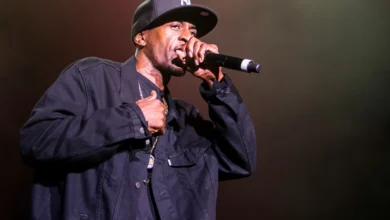Nas’ Most Controversial Moments

Nas, one of the greatest rappers of all time, has a career that spans over three decades. Known for his lyrical mastery, poetic storytelling, and contributions to the evolution of hip-hop, Nas has built an empire and cemented his place in the pantheon of music legends. However, like many influential figures, his journey has been marked by a few controversies that have sparked intense debates within the music industry and beyond. Here’s a look at some of Nas’ most controversial moments.
1. The “Ether” Diss Track and the Jay-Z Beef
One of the most well-known and talked-about moments in Nas’ career was his infamous feud with Jay-Z. The rivalry between the two New York rappers reached its peak in 2001 and 2002, sparking one of the most intense battles in hip-hop history. The beef was rooted in a series of diss tracks, but Nas’ “Ether” is widely regarded as one of the most cutting tracks in rap history. Released on his Stillmatic album in 2001, “Ether” was aimed directly at Jay-Z, and it delivered devastating bars that targeted everything from Jay-Z’s street credibility to his financial success.
The release of “Ether” led to Jay-Z’s own response track, “Takeover,” but it was Nas’ track that would define the battle. While the rivalry was intense, it helped solidify Nas as a true lyricist who could hold his own against industry giants. The feud eventually fizzled out, and the two rappers eventually reconciled, with Jay-Z even inviting Nas to perform with him during his 2005 I Declare War concert.
2. The “N-Word” Controversy
In the early 2000s, Nas found himself at the center of a controversy surrounding the use of the “N-word” in his music and public statements. In 2008, Nas declared that he wanted to “retire” the word in his music, stating that it had lost its power and meaning. This decision sparked intense debate about the use of the word in hip-hop culture. Some fans and critics praised Nas for his bold stance, arguing that the term had become overused and devalued in the music industry. Others, however, felt that Nas’ position was too idealistic and ignored the complex cultural history surrounding the word.
Nas had already used the word extensively in his music, with tracks like “N.Y. State of Mind” and “The World Is Yours,” but his decision to step back from using it led to conversations about race, language, and hip-hop’s relationship with historical oppression. While Nas didn’t completely abandon the word in his later music, his public stance led to important discussions about its place in modern culture.
3. The “Hip-Hop Is Dead” Statement
In 2006, Nas released his album Hip-Hop Is Dead, sparking widespread discussions and controversies about the state of the genre. The album’s title and its themes suggested that the golden era of hip-hop was over, and many interpreted it as a criticism of the direction hip-hop was taking in the mid-2000s. At the time, mainstream rap was dominated by artists like 50 Cent and the rise of ringtone rap, which Nas and other purists saw as a departure from the genre’s roots.
The title “Hip-Hop Is Dead” was a direct critique of the commercialization of hip-hop and the lack of substance in much of the music that was getting mainstream attention. While some fans and artists applauded Nas for his bold statement, others took issue with the claim, arguing that hip-hop was evolving and still very much alive in various forms. The controversy fueled debates about the authenticity of contemporary rap and Nas’ role as a self-proclaimed “conscience of hip-hop.”
4. The “Illmatic” God Complex
Nas’ debut album, Illmatic, is often hailed as one of the greatest albums in hip-hop history, and for good reason. However, Nas’ immediate success and the unparalleled acclaim that Illmatic received set the bar incredibly high for his subsequent work. In interviews following the album’s release, Nas expressed a sense of frustration and even resentment about the expectations placed on him as the “savior of hip-hop.” He was often asked about whether he could top Illmatic, and the constant pressure led to tensions in his career.
At one point, Nas made a comment about the “Illmatic” era that caused controversy, as he remarked that he had never felt like an “underdog” or in need of validation. Some critics and fans viewed his attitude as arrogant, especially since his follow-up albums, though critically acclaimed, did not replicate the same level of success. Nas’ early confidence in his artistry, combined with the pressure to live up to his own legacy, created an image of the rapper as someone who was both supremely confident yet burdened by his own mythos.
5. The Kelis Divorce and Public Back-and-Forth
Nas’ personal life has also made headlines, particularly his highly publicized divorce from R&B singer Kelis in 2010. The couple had a tumultuous relationship that was played out in the public eye, and their divorce led to a bitter legal battle. Kelis accused Nas of not providing proper financial support for their child, while Nas countered with allegations about her actions during their marriage.
Both Nas and Kelis have spoken publicly about the pain of the divorce, and while they eventually moved on, the back-and-forth in the media painted a picture of a relationship filled with drama. In the years following their split, Nas continued to speak about the emotional impact of the divorce, and Kelis addressed her struggles as well. The situation exposed the challenges of navigating a public breakup while both individuals remained in the public spotlight.
6. The “No Role Modelz” Lyric Controversy
In 2014, Nas sparked a brief controversy with a lyric from his song “No Role Modelz,” where he rapped, “I’m just a man who’s been hurt, but I’m trying to put my pain in a verse.” Some interpreted this line as a shot at other artists in the hip-hop community, particularly those who marketed a false image of themselves. Critics were quick to dissect the lyric, with some claiming that Nas was speaking out against the trend of rapper personas that didn’t align with real-life experiences.
However, others saw the line as Nas being reflective, as he has always been a lyricist who addresses personal struggles and growth. The song and its lyrical content sparked a debate over authenticity in hip-hop, and whether artists were still willing to be vulnerable and truthful about their struggles.
Nas’ career is undoubtedly defined by his talent, but it has also been shaped by the controversies and moments that have sparked intense conversations. Whether it was his legendary feud with Jay-Z, his stance on the “N-word,” or his critique of hip-hop’s commercial shift, Nas has always used his voice to challenge norms and push boundaries. While these moments have occasionally sparked debate, they have also added to the complexity of Nas as both an artist and a cultural figure, ensuring that his place in hip-hop history remains unchallenged.




